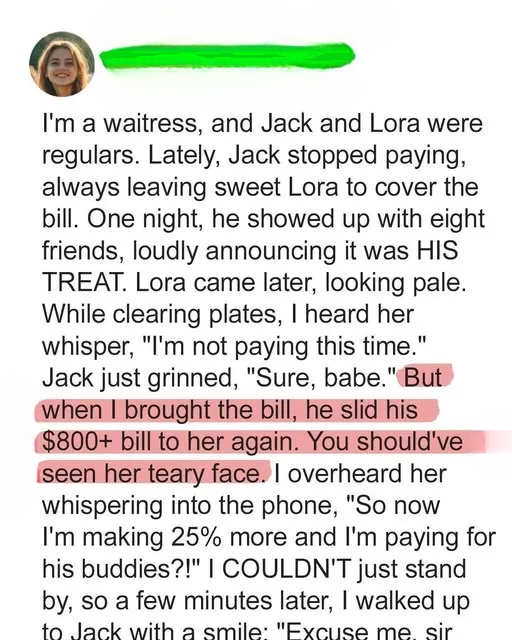I’ve waited tables long enough to notice when something is off between couples. Jack and Lora always caught my eye. They used to laugh together over shared desserts, but lately, the joy was gone. I’d watch Lora quietly slide her card across the table while Jack turned away, joking about “forgetting his wallet.” She’d smile faintly, hiding the frustration in her eyes. Then one night, everything came to a head.
It was a busy Friday, and Jack arrived with eight friends. “Dinner’s on me!” he announced, slapping the table, and his friends cheered. I raised an eyebrow—his “on me” didn’t feel sincere. Later, Lora arrived, hesitant and pale, but joined the table. She barely touched her food, sipping water while Jack entertained the crowd. When I brought the bill—$812 before tip—Jack pushed it toward Lora. “Here you go, sweetheart,” he said casually. Her expression spoke volumes.
I couldn’t stay silent. Approaching him politely, I asked, “Excuse me, sir—since you said it was your treat, how would you like to pay?” His grin faltered. His friends laughed, and one reminded him, “You said it was on you!” Jack muttered, “I don’t have my card.” I stayed calm: “No problem—I can hold the check while you run to the ATM.” The room filled with quiet laughter, a mix of humor and justice.
Something changed in Lora. She stood tall and said, “I’ll pay just for myself.” The silence that followed was deafening. Jack’s face turned red, his frustration obvious. Lora left with her head held high. A week later, she returned alone, ordered coffee and lemon pie, and smiled quietly. “I moved out,” she said simply. “I realized I was paying for everything but getting nothing in return.”
That night wasn’t just about a restaurant bill—it was about reclaiming her dignity. Watching her sip her coffee, finally free, reminded me that standing up for yourself often starts the moment you stop carrying someone else’s burden.
